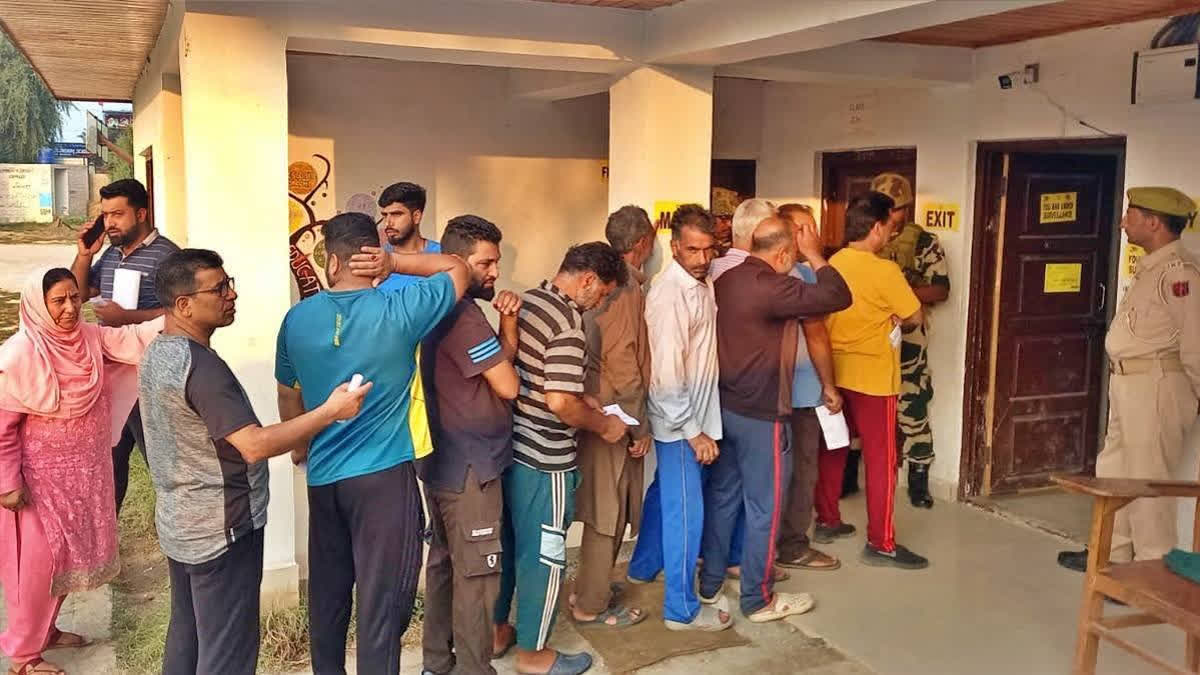Srinagar: The third and final phase of the Jammu and Kashmir Assembly elections is set for October 1 and it promises to be a high-stakes contest with a host of political heavyweights, former ministers, legislators and bureaucrats vying for victory. As the campaign period closed on Sunday, voters are preparing to decide the fate of many prominent figures, many of whom have long-held positions of power in the region.
In Jammu Division, the Bharatiya Janata Party (BJP) is contesting all 24 seats in this phase, with Congress fielding candidates in 19 constituencies. The National Conference (NC), having entered a pre-poll alliance with Congress, is contesting only five seats, with one notable exception: Nagrota, where NC and Congress are engaged in a "friendly contest." Both parties are also supporting J&K National Panthers Party's Harshdev Singh in Chenani.
Key figures in the fray include former ministers Tara Chand (Chhamb), Mula Ram (Marh) and Ajay Sadhotra (Jammu North). In the fiercely contested Jammu South-RS Pura seat, voters will choose between Raman Bhalla and Choudhary Gharu Ram.
Other significant candidates include former legislator Devender Singh Rana, contesting from Nagrota on a BJP ticket, former legislators Rajiv Sharma from BJP (Chhamb), Shivdev Singh is contesting as an Independent from Jammu North and Balbir Singh on a Congress ticket from Jasrota.
Meanwhile, four former bureaucrats, who recently transitioned to politics, are also testing their electoral fortunes. These include Mohan Lal and Ashok Bhagat (Akhnoor), Mohan Lal Kaith (Marh) and Dr Bharat Bhushan (Kathua).
Mohan Lal and Bharat Bhushan received BJP tickets while Ashok Bhagat and Mohan Lal Kaith are contesting as Independents. All four of them are bureaucrats, who jumped into the electoral fray, adding a layer of intrigue to the phase’s lineup.
In Kashmir Division's 16 constituencies, the contest is similarly fierce. The BJP has fielded candidates in five seats, Congress in five, while the NC is contesting in 13 seats. The PDP led by former Chief Minister Mehbooba Mufti, is contesting 15 seats. Key matchups include NC Javaid Ahmad Mirchal versus Apni Party's Raja Manzoor Ahmad Khan in Karnah and NC's Saifullah Mir against JKPC’s Bashir Ahmad Dar in Trehgam. All four --Mirchal, Khan, Mir and Dar--are former legislators.
Kupwara is shaping up to be a key battleground, with several prominent leaders in the mix. Sajad Gani Lone, a former minister, is contesting from Kupwara and Handwara for JKPC, while Nasir Aslam Wani of the NC and former MP Mir Mohammad Fayaz of the PDP are also vying for Kupwara. At Handwara, former NC minister Chowdry Mohammad Ramzan is up against former minister Sajad Gani Lone while former police officer Javaid Riyaz Bedar is contesting on an NC ticket against Imran Raza Ansari (JKPC).
In Baramulla, another major battleground, former legislator Abdul Rashid Dar is contesting from Sopore while former minister Taj Mohi Ud Din is contesting from Uri. In Rafiabad, two former ministers--NC's Javid Ahmad Dar and PC's Abdul Gani Vakil--are locked in fierce competition. Additionally, Pirzada Farooq Ahmed Shah, a former bureaucrat contesting on an NC ticket, will face former cabinet minister Ghulam Hassan Mir of the Apni Party in Gulmarg.
Former legislators Shoaib Nabi Lone, an Independent, supported by Abdul Rashid Sheikh and Javid Hassan Baig of the National Conference (NC) will witness face off for the Baramulla seat. Adding to the competition, Baig's uncle and former J&K Deputy Chief Minister Muzaffar Hussain Baig is also contesting from the same seat.
In the Wagoora-Kreeri seat within the same district, former minister Syed Basharat Ahmed Bukhari is contesting on a PDP ticket. Meanwhile, in Sonawari, Bandipora, former legislator Yasir Reshi is contesting as an Independent backed by Abdul Rashid Sheikh. In Bandipora, former legislator Nizam Uddin Bhat is contesting on a Congress ticket with NC's support. Additionally, former minister Nazir Ahmad Khan, also known as Nazir Gurezi, is contesting from the Gurez segment.
According to the Election Commission of India (ECI), in total, over 39.18 lakh voters will cast their votes across 40 constituencies in seven districts of the Union Territory. A total of 5,060 polling stations have been set up across seven districts--Kupwara, Baramulla, Bandipora, Udhampur, Samba, Kathua, and Jammu--each polling station has four election officials, including a Presiding Officer. Over 20,000 polling personnel have been deployed to manage the voting process for the third phase.
"A total of 39,18,220 eligible voters can cast their votes, including 20,09,033 men, 19,09,130 women and 57 from third gender. Among them, 1.94 lakh are young voters aged 18-19, along with 35,860 specially-abled, and 32,953 elderly voters aged over 85," ECI said in a statement.
It further read: "Voting will take place from 7 am to 6 pm, with an extension if voters are still in line at 6 pm. Special polling stations include 50 'Pink' booths managed by women, 43 booths managed by specially-abled persons, and 40 booths run by youth. Additionally, there will be 45 'Green' polling stations to promote environmental awareness, 33 unique polling stations and 29 stations near the Line of Control (LoC) and International Border (IB) for residents in those areas."
Read more: Seizures Worth Rs 130 Cr Made During Jammu Kashmir Assembly Polls: Chief Electoral Officer



